On 6 February 2023, at 04:17 TRT (01:17 UTC), a magnitude 7.8 earthquake struck southern and central Türkiye and northern and western Syria. The epicentre was 32 km (20 mi) west–northwest of Gaziantep. At 13:24, there was a second magnitude 7.7 earthquake centred 95 km (59 mi) to the north-northeast from the first, in Kahramanmaraş Province. There was widespread damage and tens of thousands of fatalities.
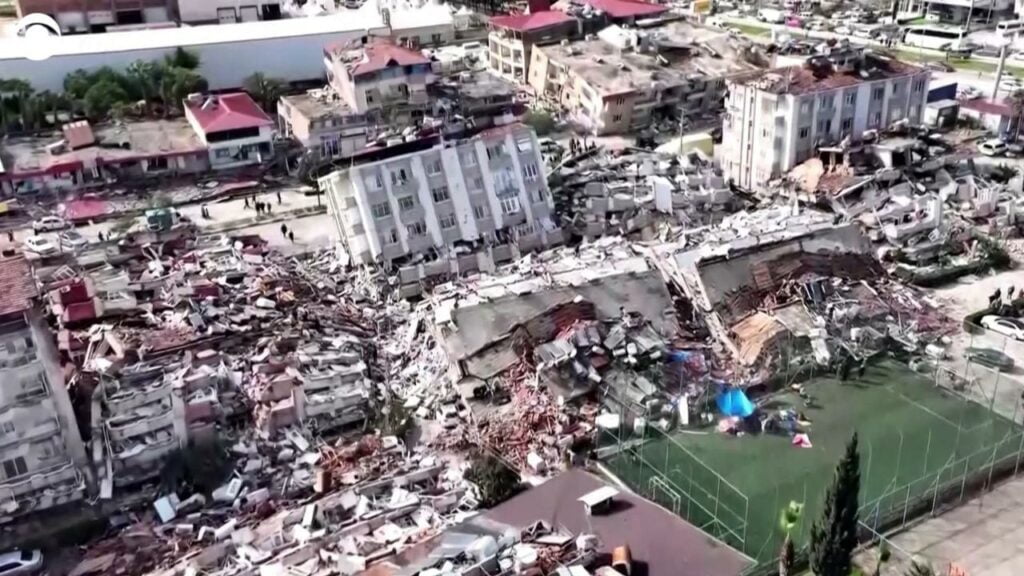
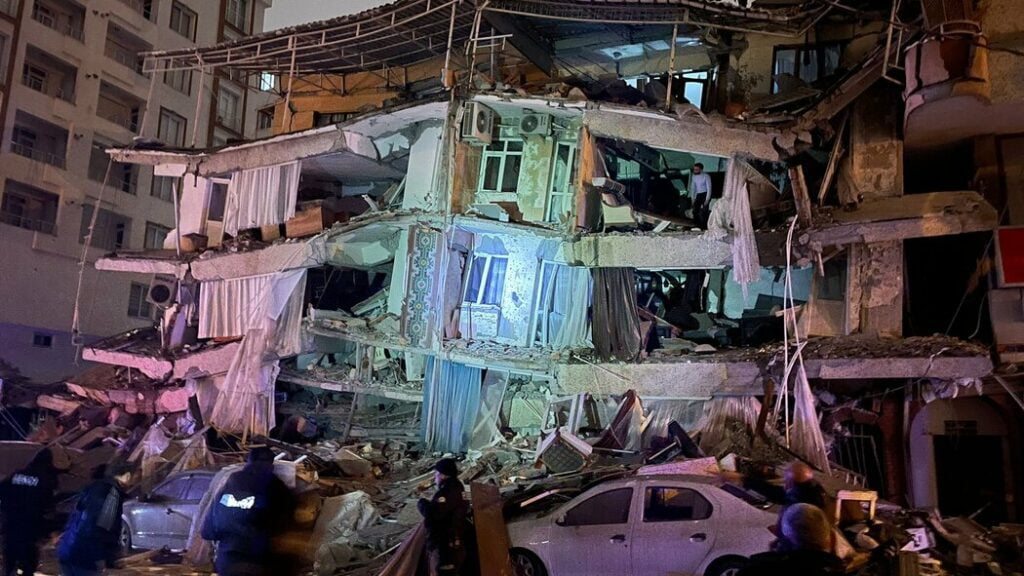
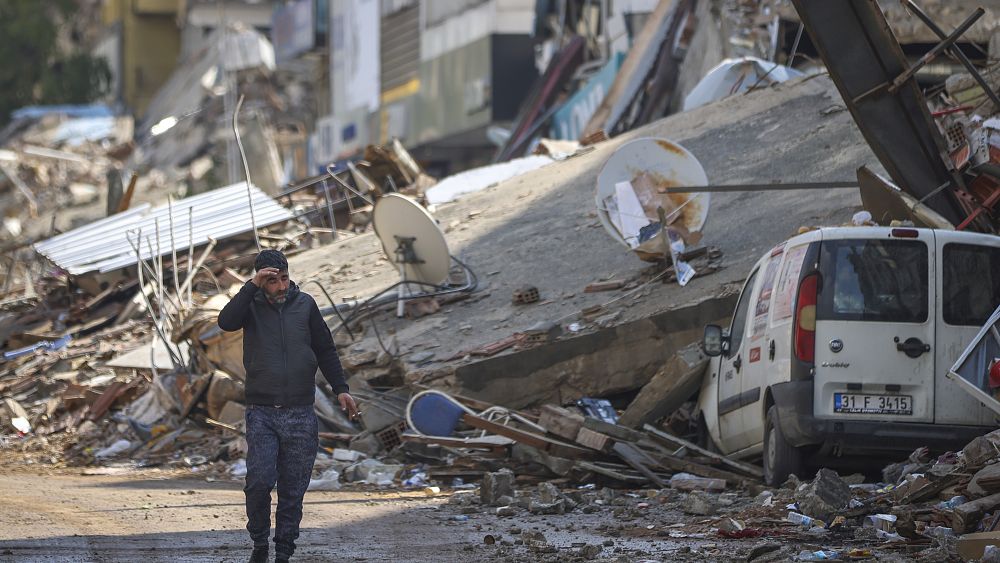
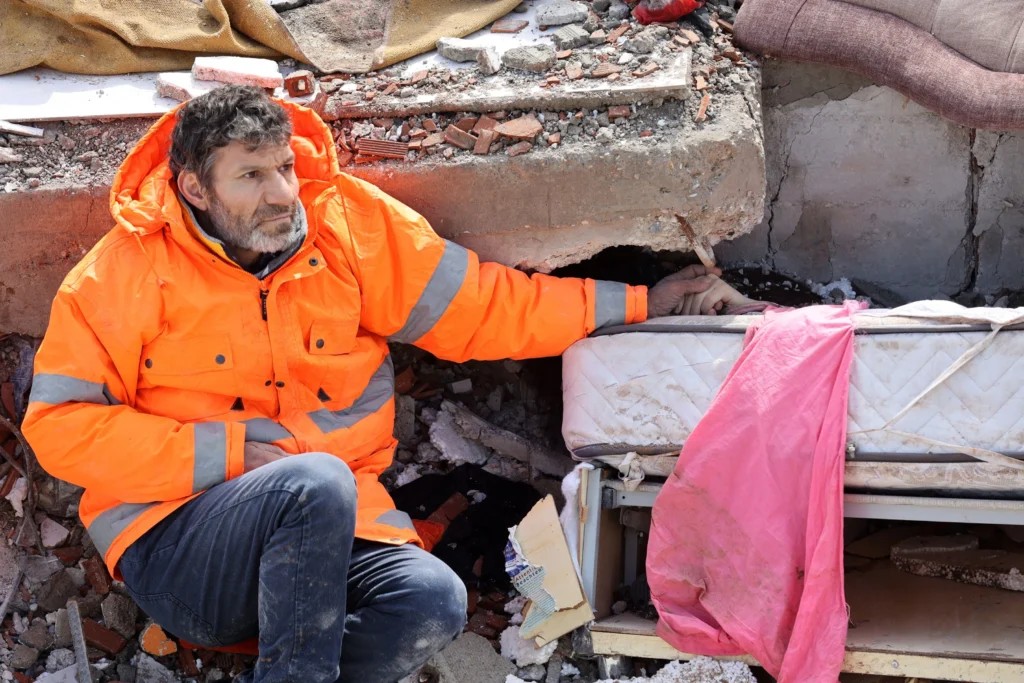
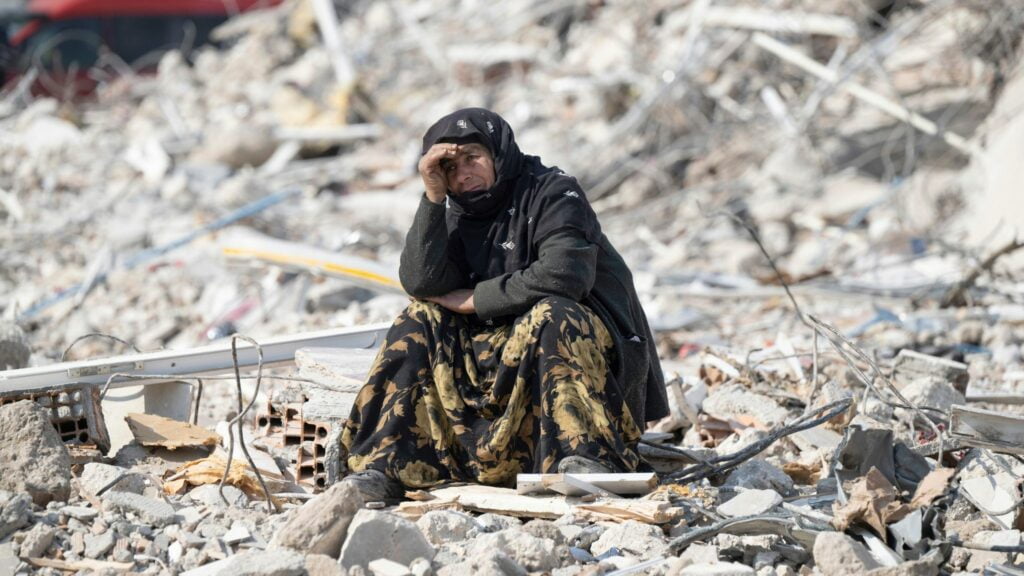
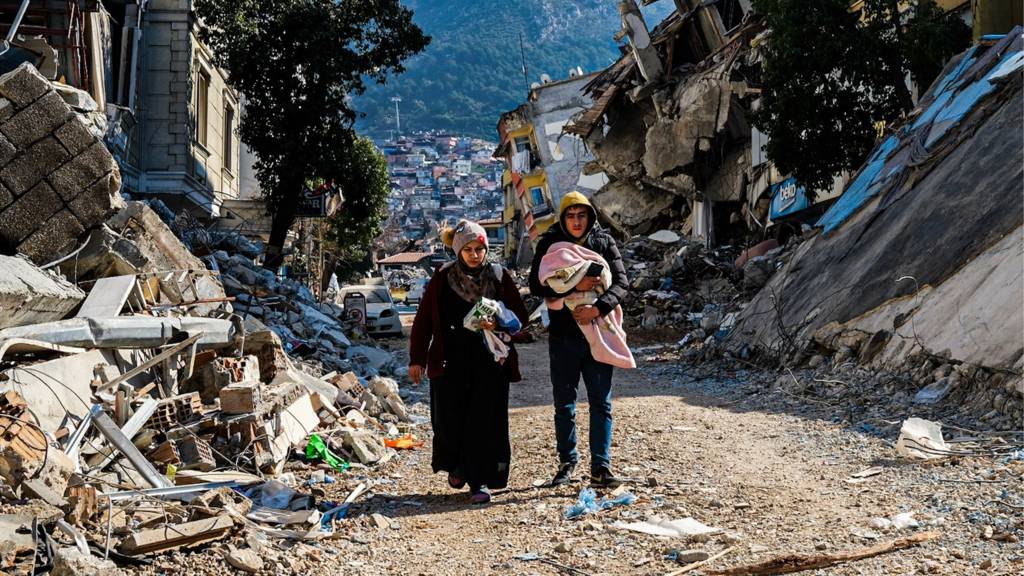
The magnitude 7.8 earthquake was the strongest to occur in Türkiye since the 1939 Erzincan earthquake of the same magnitude, causing widespread damage in an area of about 350,000 km2 (140,000 sq mi) (around 12 times the size of Belgium).
As of 4 March 2023, more than 52,700 deaths were confirmed: more than 45,900 in Türkiye, more than 6,700 in Syria, and more than 108,000 have been injured.
It is the deadliest earthquake in Türkiye since the 526 Antioch earthquake and the deadliest in Syria since the 1822 Aleppo earthquake. It is the deadliest natural disaster in Türkiye’s modern history.
An estimated 14 million people, or 16 percent of Türkiye’s population, were affected. and an estimated 1.5 million people were left homeless. – Source: Wikipedia
Why this happened here
This area of Turkey is prone to earthquakes as it lies at the intersection of three of the tectonic plates that make up the Earth’s crust: the Anatolian, Arabian and African plates. Arabia is moving northwards into Europe, causing the Anatolian plate (which Turkey sits on) to be pushed out westwards.
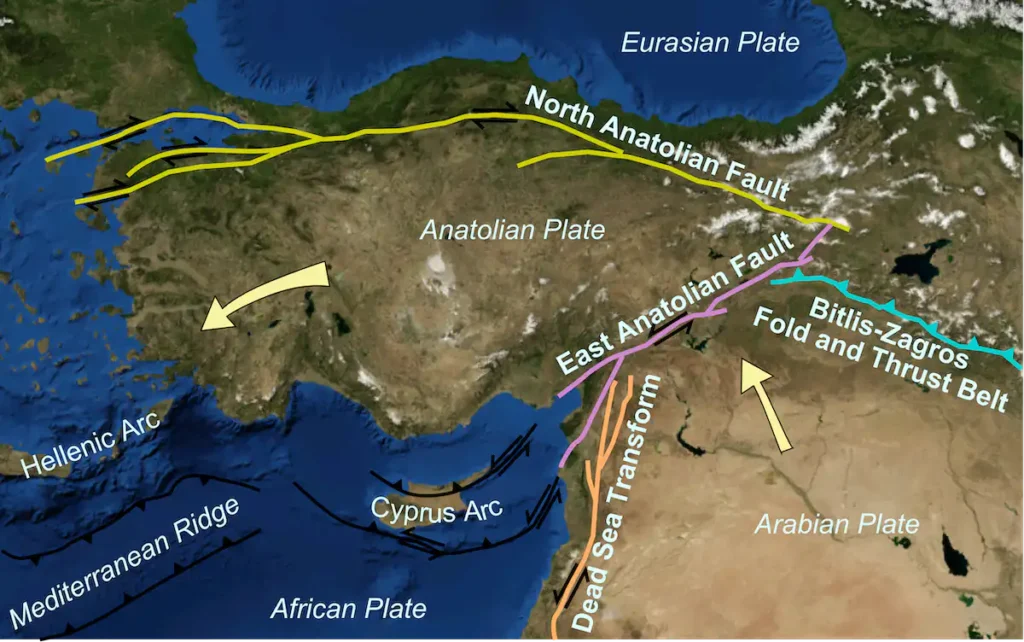
The movement of the tectonic plates builds up pressure on fault zones at their boundaries. It is the sudden release of this pressure that causes earthquakes and ground shaking.
You can read more here: Turkey-Syria earthquakes: a seismologist explains what has happened
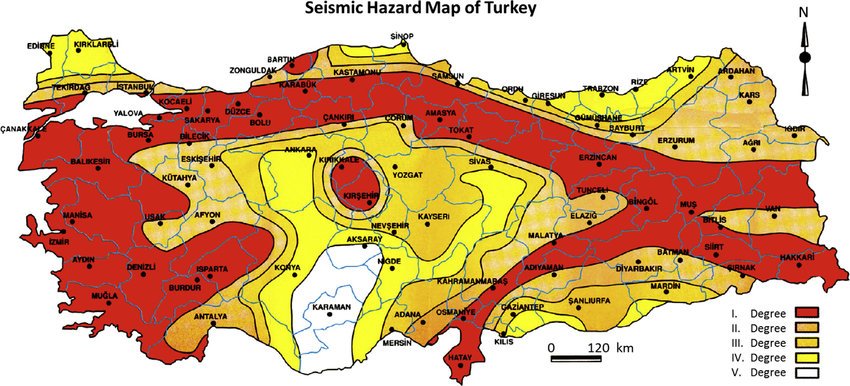
Fethiye, a small coastal town-population 3,000
Fethiye was a small coastal town in 1957 with a population of around 3,000. This quiet world abruptly changed on the evening of 24 April 1957 when, following a series of earth tremors, residents were told to leave their homes and not return.
As a result, when a 6.2 quake hit the town at 21:17 followed by a 7.1 quake at 04:28 on 25th April, there was far less loss of life than would have otherwise resulted. The earthquake destroyed many buildings, but as a result of the foresight of Fethiye’s governor, Kamil Nezih Okuş, only 19 people were killed.
The following photographs were taken by the official photographer from HMS Dainty, a British Royal Navy D-Class destroyer which arrived from its base in Cyprus three days after the quake, bringing tents, blankets, water purification tablets and medical supplies.






Fethiye municipality uses the collection of photographs from time to time as part of an informative programme to reinforce the importance of being prepared, should there be another earthquake.
AKUT – be prepared for earthquakes
In 1995, an unsuccessful search for two university students lost in the Bolkar mountains prompted a small group of professional mountaineers to establish AKUT Search and Rescue Association (Turkish: AKUT Arama Kurtarma Derneği). Realising the earthquake risk in Turkey, they completed additional training and are now a pivotal player in raising awareness in preparation for emergencies. All members of the AKUT team are volunteers; the Turkish government officially declared AKUT as an “NGO working for public benefit” in 1999.
AKUT gained classification by the United Nations International Search and Rescue Advisory Group in 2011 and is one of only three organisations in Turkey that has INSARAG classification.
An earthquake can happen at any time and usually comes without warning. By preparing yourself and your family before an earthquake happens, you can minimize the risk of injury and damage to your home.
AKUT: What to do before an earthquake
Make sure that the building where you live or work has been inspected to ensure that it meets the appropriate building standards.
Make sure that your property and personal items are insured against any loss, resulting from an earthquake.
Identify safe places in your household, children’s school, workplace and any other location where you frequently spend time.
Identify a safe meeting point with your family should you be separated when an earthquake occurs. This could be the local school gymnasium or a basketball court in your local neighbourhood.
Make an emergency plan, which includes the meeting points, and have a regular “drill”, so you all know what you need to do if an emergency occurs.
Make sure that you know how to switch off your utilities. They should be switched off in this order – gas, electricity, and water. However, if there is any smell of gas, do not touch the electrical supply and leave the property promptly.
Make sure that you secure any items that may topple over. This includes objects such as tall bookcases or cabinets and gas bottles. Don’t hang heavy pictures or mirrors above the bed.
Make sure that any chemicals are adequately stored.
Prepare an emergency bag. This should include the following items:
Must-Have Items
- Drinking water
- Non-perishable food
- First aid kit
Advised
- A radio
- A torch
- Spare batteries
- Battery charging pack
- Cash
- A notebook and pen
- A whistle
- Important documents, such as insurance papers and title deeds
- Passport or ID
- A phone book, containing important numbers
Personal Items
- A blanket
- Any prescribed medication, such as blood pressure medication or insulin
- Baby food, feeding bottle, nappies
- Any other personal items that are needed by you or your family
Keep a pair of footwear, a torch and your mobile phone by your bed.
You can reach all emergency services by dialling 112
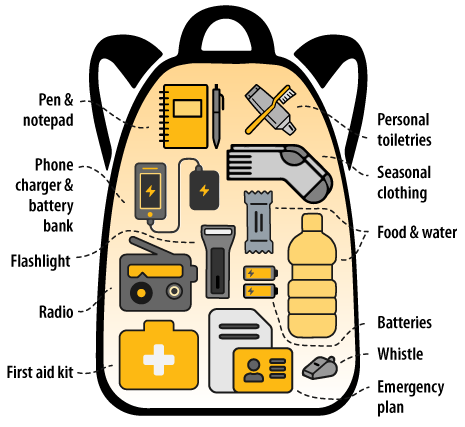
What to do during an earthquake
If you find yourself in an earthquake, remember to “Drop, Cover, and Hold On.” Drop to your hands and knees, cover your head and neck with your arms, and seek shelter under a sturdy table or desk. Hold on until the shaking stops. If you’re outside, move away from buildings, trees, and power lines, then drop and cover.
What to do after an earthquake
Once the shaking stops, stay calm and check for injuries. If you’re indoors, be cautious when exiting, as aftershocks can cause additional damage. If you’re near the coast, be aware of the potential for tsunamis and move to higher ground if necessary.
You will most likely receive alerts from AFAD (Disaster and Emergency Management) advising you of the next steps to take. It’s advisable to keep phone lines open for emergency services and instead send a message to friends and family.
Other resources
Earthquake Safety in Turkey: What Every Prospective Traveler Should Know
Be Prepared: Household Earthquake Safety Tips and Helpful Home Modifications to Consider
Article updated on Tuesday 3rd June, 2025

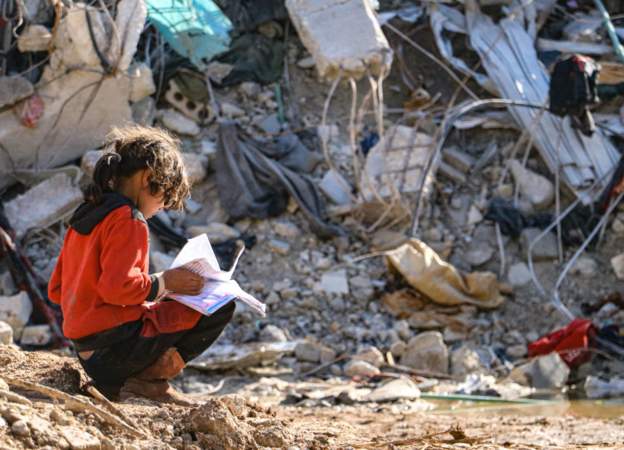







2 responses
Hello,
My name is Sam Laemmle and I will be traveling to Turkey from January to November 2024 to aid in the 2023 Earthquake response. My heart goes out to the people of Eastern Turkey, and I wish to commit months of my time and energy to help those in need, especially children.
I have hands-on volunteering experience, fast language learning skills, and a strong heart, hands, and mind, to help those in need.
I ask you to help me connect with an organization that is still operational near the border. Could you send me contact information from people within active organizations, or the contact information of someone who has connections?
Your help is greatly appreciated,
Thank you,
Sam
Thank you for your message Sam.
We would suggest you contact the following organisations as a starting point:
AFAD in Türkiye; https://en.afad.gov.tr/
DEC (Disater Emergency Committee) in the UK: https://www.dec.org.uk/
They should be able to help you.
Kind regards
Fethiye Times team 🧿